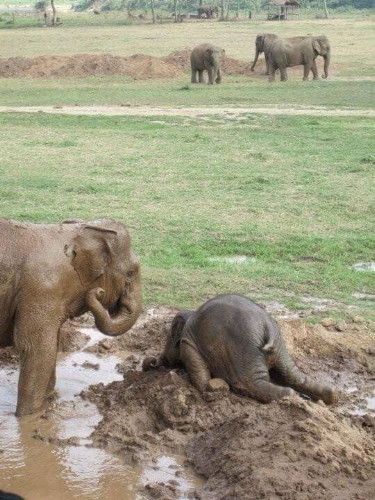Beyond Your Backyard: Every Day is Family Day for Elephants
A beautiful African Elephant family stopping at the old watering hole for a drink
Kimberly J. Epp.
Baby elephants have temper tantrums just as human children do. (Source: Elephant Nature Park, Thailand)
This long weekend in Saskatchewan, many families are heading off to the lake or planning activities near home to celebrate the August "Family Day" weekend. But did you know that there is another species on earth that has the most amazing family structure of any other land mammal? That would be the elephant, of course, of which there are African Elephants, Asian Elephants - and even Pygmy Elephants.
You may have family reunions with your relatives, but elephants live with their extended family most or all of their lives. Feminism existed long before humans came to this world. Look no further than the elephant family that makes up their herd. The herd is led by the oldest cow called the matriarch - the grandmother or even the great grandmother. The rest of the herd is made up of her daughter's and their calves. When the matriarch dies, the oldest daughter takes over. They have their royal family rules down to a tea!
Photo by Tad Kelly
In a crisis, the herd relies on the matriarch to make major decisions. Herd numbers are usually 6 to 12, but herds of 12 to 20 are not uncommon, dependent on species. The male calves stay until they are old enough to make it on their own or enter sexual maturity. They will then lead solitary lives. The females, however, live together their entire lives. If the herd becomes too large, sometimes some of the daughters may go off on their own and start their own herds. They will still get together with the rest of the family to visit, just as humans do!
As they travel, the daughters follow the matriarch with the calves in single file. The calves follow their mothers obediently, sometimes holding onto the mothers tails with their strong little trunks. If the calves become too tired, the whole herd stops to allow them to rest. The matriarchs teach their daughters to care for their young, and assist in childcare as well. A calf is essentially raised by the herd. The term "being raised by a village" almost fits here, especially within the larger families.
The babies are born without any real instincts, so everything must be taught. Elephants carry their young for 22 months (dependent on species), the longest of any mammalian land pregnancies. Compared to most other land mammals, they also care for them the longest. The matriarch determines what is most important for the little ones to learn, and the daughters then act accordingly in teaching their calves.
A gorgeous Asian Elephant family in India.
The matriarch leads the herd on daily walks up to 80 km a day to find food, water and shelter. Elephants have a diet with over 200 wild plants and fruits. The problems seen with captive elephants - like arthritis, compaction and foot rot, are virtually unheard of in wild elephants. The more I learn about elephants, the more I want to help them. We just cannot let these majestic intelligent creatures fade away.
Trunks up to the wonderful, powerful matriarchs of the pachyderm families. Every day is family day for them, so we must continue to fight for the captive lonely elephants like Lucy - so she one day can also enjoy the benefits of a new adoptive family.
----------------------------------------------------------------------
Epp is an Environmental Educator and writer with over 25 years of experience in Environmental Education. She can be reached at kepp@shaw.ca.




